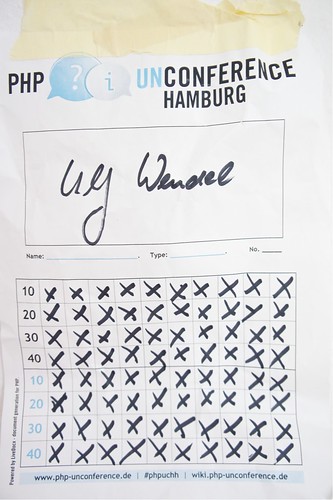Frühlingsputz: weg mit den alten Zeitungen! Noch mehr Wohnung kann ich mir nicht leisten!
Halt: das sind keine Fotomagazine, keine Geo-Hefte, keine Airbrush-Magazine und auch keine normalen Computerzeitschriften. Was mir in die Hände fällt sind Belegexemplare. Genussvoll blättere ich im moderigen Papier. Gedanken kommen auf. Als ich das schrieb, saß ich mit dem Dell-Notebook, welches ich für den Kongress…
Bei Betrachtung der Liste drängt sich mir der Eindruck einer einseitigen Ernährung auf. Für den Herbst, nachdem mein Beinbruch auskuriert ist, sollte ich mir etwas Neues ausdenken. Bis dahin werde ich mich wohl auf Blogging konzentrieren.
Veröffentlichungen
PHP Spezial (Linux Enterprise), erschienen Herbst 2001
Ja, ich hatte wirklich mehrere Artikel in dem Heft.
- PHP-Community bündelt Kräfte – Der neugegründete PHP Verein stellt sich vor
- Zeit gewinnen mit Templates – Trennung von Layout und Code
- Schnelligkeit durch Faulheit – Applikationen beschleunigen mit dem PEAR Daten/Content Cache
- Websites, Tools und Editoren – Die besten Quellen rund um PHP
- "Wir wollen ein Bindeglied sein", Interview von Sebastian Bergman mit Ulf Wendel, Georg Richter, Jörg Behrens und Thomas Fromm, Mitglieder des neu gegründeten PHP-Vereins (ebenfalls erschienen in Linux Enterprise, September 2001)
PHP im Einsatz (Begleitbuch zur PHP Konferenz 2001), erschienen 2002
Objektorientierte HTMLForms
PHP Magazin, 4.2003
Datenkapsel – Von DAOs, Business Entities, Resultsets und Spreadsheets – Teil 1
PHP Magazin, 5.2003
DAOs, die Zweite – Resultsets als Mittel zur komfortablen Suche – Teil 2
PHP Magazin, 6.2003
Reiseziel Access im Web – Von Spreadsheets, Controllern und Interpretern – Teil 3
PHP Magazin, 1.2004
Zielgerade – Von Betacode und Fernzielen: Data Access Objects – Teil 4
PHP Magazin, 6.2005
MySQL 5.0 und MaxDB 7.6 – Reifeprüfung
mysql.com, 12/2005
MaxDB for SAP Hosting – Technical Whitepaper
SAP Info, 1.2006
MaxDB: Hohe Professionalität, niedrige Betriebskosten
SAP Info, 2.2006
MaxDB: Sicherer Betrieb für Anwender und Entwickler
Entwickler Magazin, 2.2006
MySQL 5.0 – Best Practices: Tipps und Tricks zu MySQL
PHP Magazin, 3.2006
Backen für PHP-MySQL-Anwender unter Windows – Es ist angerichtet
PHP Magazin, 4.2006
Hand in Hand – Wie XA-Transkationen und das Zwei-Phasen-Commit-Protokoll aus MySQL und Oracle Freunde machen
php|architect, December 2007
Going Native With mysqlnd – Learn about the new MySQL driver for PHP
Linux Magazin Technical Review: Alles über: Datenbanken – Praxistipps von Entwurf bis Tuning (Buch), Ausgabe 2008
Fünf Fragen an MySQL: Storage Engines, Unicode, Neuerungen, Zukunftsaussichten, Geodaten
PHP hates me, 2.2009
Nimmer Ärger mit den Persistenten Verbindungen von MySQL
PHP Magazin, 5.2010
Guerillia Gardening im MySQL-Treibhaus – Mit mysqlnd-Plug-ins den Datenbanktreiber erweitern
PHP hates me, 7.2010
Ulf Wendel und das MySQL-Mofa
Entwickler Magazin, 1.2011
Ich sehe was, was Du nicht siehst – Ein transparentes MySQL-Cache-Plug-in für PHP
Vorträge (Konferenzen)
PHP Konferenz 2000, Köln
PHPDoc
International PHP Conference 2001, Frankfurt
Workshop: After OOH-Forms: auto-layout, XML and wizards
International PHP Conference 2003, Frankfurt
Workshop: Applikationsbasiertes Caching
(Jan Kneschke, Ulf Wendel )
Zeigen, Bearbeiten und Speichern von Data Access Objects (DAOs)
Die OOP-Sprachfeatures von PHP im Vergleich mit anderen Technologien
PHPUG Hamburg, Dezember 2003
DAO, Resultsets und Spreadsheets – was PEAR nicht kann
International PHP Conference 2008, Mainz
Running Asynchronous Queries using ext/mysqli and mysqlnd
International PHP Conference 2010 Spring Edition, Berlin
Das MySQL-Treibhaus erweitern (The PHP mysqlnd plugin talk – plugins an alternative to MySQL Proxy)
Berliner PHP Usergroup, Juni 2010
Die mysqlnd plugin API
PHP Unconference Hamburg, September 2010
Top Ten Irrtümer und Fehler von PDO
FrosCon 2010, PHP Track, St. Augustin
The power of mysqlnd plugins
International PHP Conference 2010, Mainz
Ran an den Klienten – ein Cache-Plugin für mysqlnd (Award-winning technology: Oxid loves the query cache)
PHP Unconference Hamburg, 11/2011
PHPopstar
Gastredner und Sieger des Wettbewerbs “PHPopstar” dessen Ziel es ist Zuschauer zu motivieren Beiträge einzureichen.
Webseminare
mysql.com, April 2006
Performanzoptimierung für MaxDB
mysql.com, July 2009
Der neue MySQL Connector/C++ (The new MySQL Connector/C++)
mysql.com, July 2009
Der neue MySQL Connector/C++ (The new MySQL Connector/C++)
mysql.com, November 2011
Building High Performance and High Traffic PHP Applications with MySQL, part 3: Succeed with Plugins
Co-Moderator für Teil 1 und 2. Entwurf der Inhalte aller Teile.
Weitere Onlinepräsentationen
Juni 2010
Built-in query caching for all PHP MySQL extensions/APIs
Juni 2010
Mysqlnd query cache plugin statistics and tuning
Juli 2010
Mysqlnd query cache plugin: user-defined storage handler
Juli 2010
Mysqlnd query cache plugin benchmark report
August 2011
The mysqlnd replication and load balancing plugin
Oktober 2011
MySQL native driver for PHP (mysqlnd) – Introduction and overview, Edition 2011
Dezember 2011
Load Balancing for PHP and MySQL
Aktualisierungen – http://www.slideshare.net/nixnutz/presentations
Sonstiges
PHP BBQ Tour
Eine einwöchige Rundreise durch sieben Städte in Deutschland mit Grillabend bei sieben deutschen PHP-Anwendergruppen. Die PHP-Anwendergruppen stellten sich vor und lockten neue und alte Gesichter im lockeren Rahmen eines Grillabends.







 Replication is as old as life on earth. No life without replication.
Replication is as old as life on earth. No life without replication. 